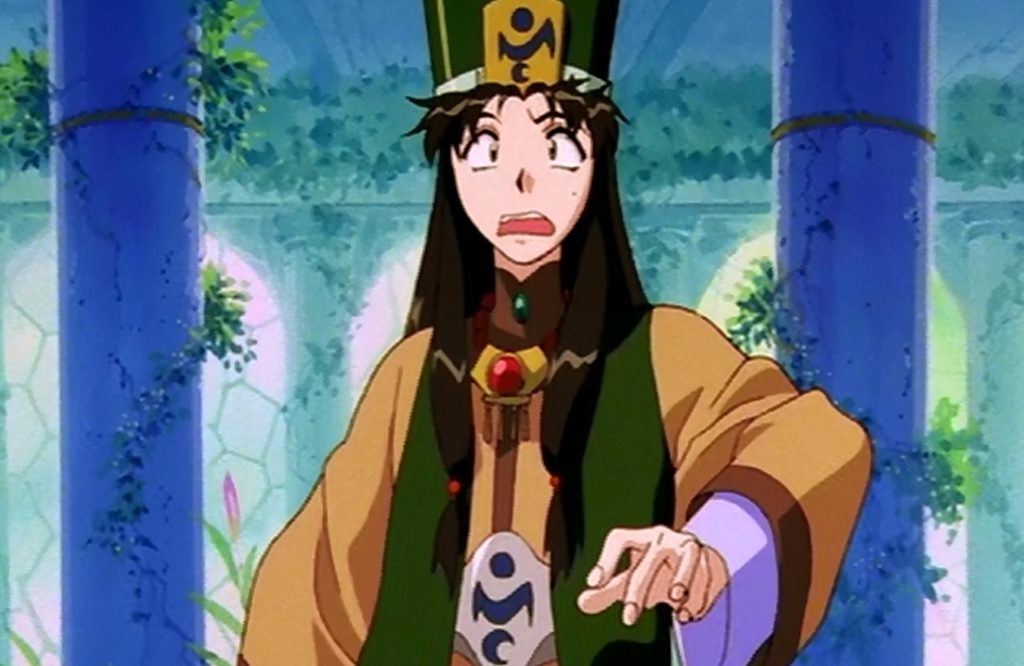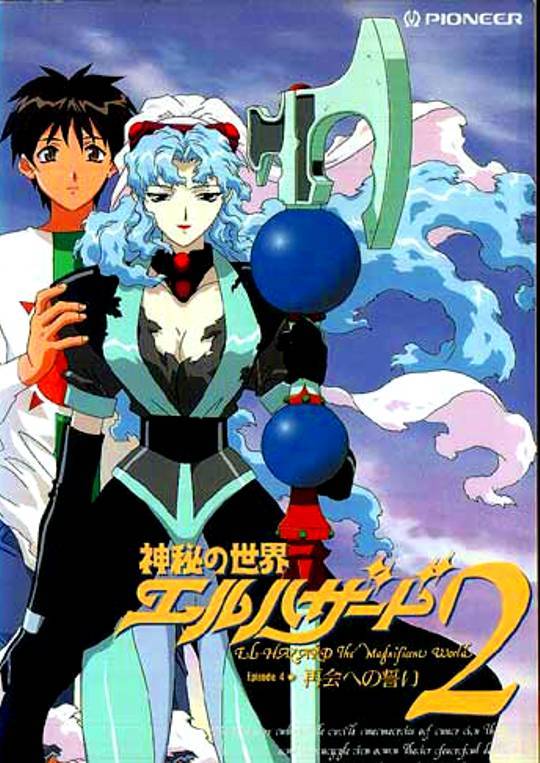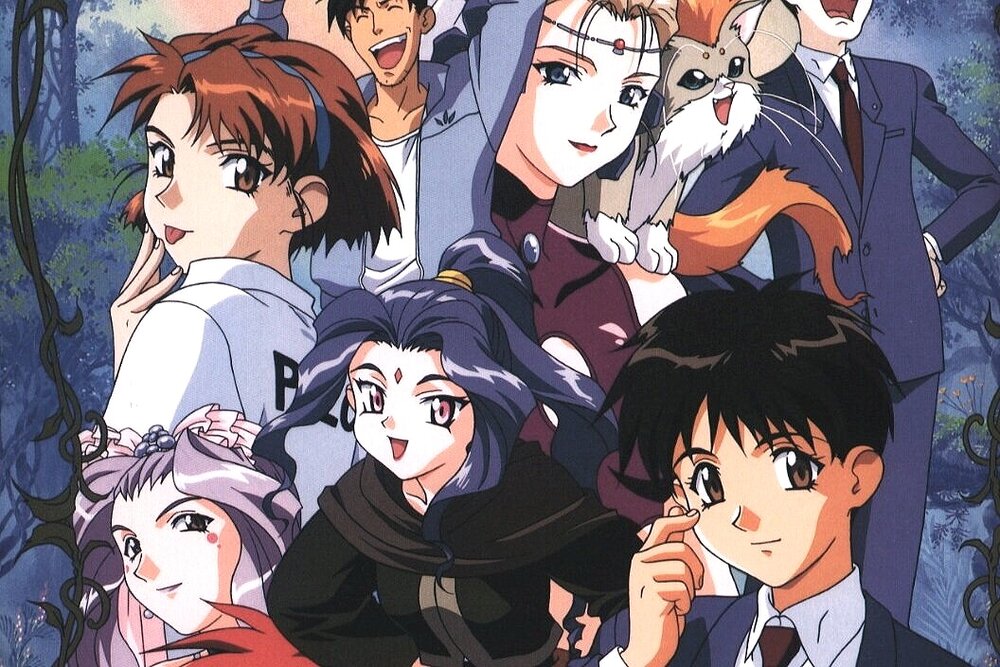El Hazard
December 8, 2021 · 0 comments
By Jonathan Clements.

Look out! You’ve just been whisked to a far-off planet peopled by exotic beauties, where magic really works and alien invaders threaten paradise. Now’s your chance to right wrongs, fight mighty battles and smite your enemies before winning the hand of a beautiful princess. So what’s the catch?
Well, some bright spark at the Hand of Fate department sent your high school teacher along as well, and he’s in a bad mood because he forgot to set the video. Your girlfriend’s gone missing in the desert and her psycho brother has signed up with the forces of evil because he never liked you anyway. And now you have to impersonate a missing lesbian princess and talk three ditzy party-priestesses into helping you out by lending you the ultimate weapon. This is one crazy world, but they’ve got one thing right. They use cats as armour.
Twenty-seven years after the El Hazard series first appeared, it occupies an odd place in anime history. For British anime fans of a certain age, and that would probably be forty-somethings, it was one of the first brightly-coloured, garish VHS releases that suddenly crowded into video stores in Pioneer’s short-lived assault on the anime market. But for many a light-novel fan, it is the grand-daddy of every cynical, sardonic isekai story of entirely everyday idiots being whisked away to a fantasy world that is far, far too good for them. Ironically, El Hazard’s creators were open about their own inspirations in pulp novels that were already approaching a hundred years of age, while one sometimes get the impression with isekai fans that they think the whole thing was invented in the 1990s.
It must have been a particularly tough day on the Tenchi Muyo crew. Pioneer’s most popular show was still big with the fans, but the formula was starting to creak. Writer Ryoe Tsukimura, a refugee from the hard-boiled actioner Metal Jack, got talking to director Hiroki Hayashi. The endless girlish giggles of Tenchi simply weren’t going anywhere. They wanted laughs, but they also wanted something with a little more oomph. Talk turned to what they would do if they had the chance to run their own show. Tsukimura, a big fan of 1940s screwball comedy, wanted to write a Marx Brothers pastiche with an anime twist, dumping a gang of nutcases into a careful comedy of manners. Hayashi was keener on epic adventure; he wanted to do an anime version of Edgar Rice Burroughs’ adventure novels, something along the lines of A Princess of Mars. A fly on the studio wall might have noticed a pregnant pause. They decided to do both at once.

Tsukimura approached the script to El Hazard in much the same way as the Black Adder team, taking average twentieth century characters and dumping them into a very different setting. And just like Baldrick and co., they’re not afraid to ask the po-faced royals embarassing questions. It’s all very well for John Carter on Mars, Tarl Cabot on Gor or all those pesky kids on Narnia, but real people just wouldn’t grow and flourish if they were whisked off to a fantasy world. They’d worry about whether they’d left the gas on, they’d go on long quests in search of Silk Cut, and most importantly of all, they’d wet themselves when they found out the fearsome alien invaders were called the Bugga’Em [Don’t listen to him; it is definitely Bagrom – Ed.].
Tsukimura’s previous scripts had been limited by the fact he was playing in someone else’s world. On Catgirl Nuku-Nuku and Airbats he was restricted in the creation of new characters and spins to the plot because the concept was owned by someone else. That’s not to say Tsukimura didn’t turn in some excellent work; he is responsible for one of the best Tenchi scripts ever. But with El Hazard, he was able to make his own world, and include everything he thought was lacking in others’ style guides. “Since I created El Hazard, those characters, that story and that setting are all my own work. I really enjoyed creating my own world. It’s been a wonderful experience for me; as a writer there are not many chances to do this.”

Hayashi provided the oriental setting, but it was Tsukimura who provided the tongue-in-cheek characters and situations. The world of El Hazard lives in a state of enforced peace. The ancient gods destroyed themselves and their powers in order to save the inhabitants from strife, and now the only problems the Hazardians face are the occasional incursions from the subterranean shapeshifters of the Phantom Tribes. Until, that is, the deadly Queen Diva assembles an army of insectoid cyborgs and prepares to seize control of the world. Actually, that isn’t much of a problem either, because in the absence of the ancient gods, even Queen Diva is a bit of a softie. The people of the kingdom of Roshtaria are pretty sure they can hold them off, just as soon as their Princess Fatora returns from hiding and agrees to go and seek the help of the Muldoon priestesses, who are sitting on a piece of “peacemaking” hardware called the Eye of God. [Immortal dialogue #1: “If I had a weapon, I’d call it Demon Something.”]
What the Roshtarians don’t know is that Fatora isn’t really in hiding at all. There are some nasty espionage games going on at court, and Fatora won’t be returning for a while. Everything changes when that gang of pesky kids from the Japanese Shinonome High School fall through an interdimensional gate and into the middle of the whole crisis. If this were an Edgar Rice Burroughs book, our hero Makoto would find himself king of the ignorant locals in record time. Not so in El Hazard, Makoto is dragged into a royal conspiracy when it is discovered he is the spitting image of the missing princess Fatora. Makoto becomes her double, hoping to fool the priestesses into unlocking the Eye of God. Makoto’s lager-lout teacher Mr Fujisawa discovers that he has incredible superhuman strength on the world of El Hazard, but he’s less interested in his beautiful alien admirers than he is in getting hold of more cigarettes. Makoto’s pragmatic girlfriend Nanami finds herself marooned a million light years from home and does the sensible thing; she gets a job as a waitress. But the only character who really fits in is the one that nobody invited.
The savage, barbarian world of El Hazard is a dream come true for school bully Jinnai, who gets a sexy bondage queen as his consort and an army of bloodthirsty insectoid minions, whom he immediately names after his favourite film stars. Jinnai’s military prowess fast becomes legendary as he teaches the rather innocent baddies how to lie, cheat and steal. Suddenly, the Eye of God isn’t merely important, it’s Roshtaria’s last hope, and only Makoto can get it.

Jinnai loathes Makoto with a vengeance. Because of his overt political naiveté manifested through his involvement in the palace conspiracy? Erm… no. Because he always did better at school and he never liked him, and he fancies his sister, and anything else he can think of. Makoto becomes a pawn in a palace power game, but still has to listen to the moans of his teacher Mr Fujisawa, who is determined to keep his pupils in line as if they’re on a very, very strange school trip. [Immortal dialogue #2: “You have disgraced the honoured name of Shinonome High throughout the galaxy.”]
Tsukimura and Hayashi got El Hazard off the ground with the backing of Pioneer’s top Mr Fix-It, producer Taro Maki. Staff were poached from other Pioneer productions, and the straight-to-video start proved its worth when, like Tenchi before it, it graduated to a full-fledged TV series. And once the initial quest had drawn to a close, the cast were dragged back for another adventure.
The English-language version of El Hazard was the jewel in Pioneer’s dubbing crown. In the hands of Jenny Haniver and John Pierce, the transition is almost seamless, with jokes and asides carefully retained in the transition. The subject of the dub came up when I interviewed Taro Maki for Manga Mania back in the 1990s, and he seemed genuinely relieved that someone had noticed. He hinted at opposition from management about his insistence on young staff who understood “the otaku mind-set,” a policy that has paid the greatest dividends on on Tsukimura’s comedy script. Perhaps one of the factors that contributes to the dubbers’ achievement is that there is very little in El Hazard that marks it out as “Japanese.” In El Hazard the Japanese cast and crew are attempting to create a world that has nothing to do with their homeland. The world of El Hazard, and the good kingdom of Roshtaria are non-existent places, and that makes it easier to transfer than, for example, the pitfall-ridden historical backgrounds of Kishin Heidan and The Hakkenden.
Hayashi’s desire for an Arabesque setting is also echoed in many of the serial’s background details. Look out for a Middle Eastern influence in names such as Efreet and Ahriman, visible even though they have been slightly mangled in the double transition through Japanese to English. The art direction by Nobuhito Sue emphasised the fairytale spires and palaces of the Arabian Nights, and the flowing silks of the oriental harem. An honourable mention should also go to Seikou Nagaoka’s music, from chords of deadpan menace to unworldy disco numbers, but especially for the thundering opening theme, which crashes Lawrence of Arabia and Battlestar Galactica into Rawhide, for an evocative taster of the fantastical magic carpet ride to follow.
So, if you’ve ever wondered why nobody goes to the toilet in sword-and-sorcery movies, why all alien queens fall simpering at the feet of dorks from Earth, or why no-one ever asks the Narnia kids how many pairs of pants they’ve packed, El Hazard is for you. Hayashi and Tsukimura are now a certified winning team (they hit the top ten anime box office figures with their collaborative effort on Tenchi Muyo in Love), and El Hazard went down in history as the first of their many successes. Hiroki Hayashi is still animating at AIC, although in the early noughties, Tsukimura made a public exit from the anime business, claiming that his screenwriting days were over. He had always wanted to be a novelist and chose to leave anime behind to pursue his dream, soon striking gold with his Special Investigators Police Dragon series of detective novels, and later becoming the chairman of the Mystery Writers of Japan.
Jonathan Clements is the author of Anime: A History. El Hazard the OVAs is released in the UK by Anime Limited.
Leave a Reply